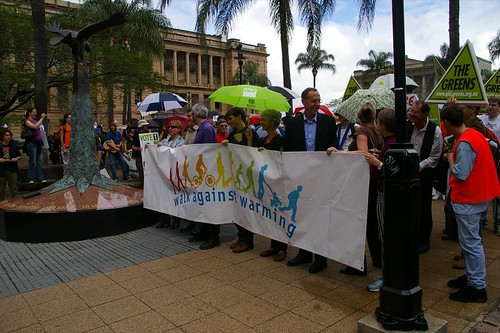This is an interesting blog article I read. It doesn't mention climate change once though does peak oil. It provides a picture of what we may be in for in coming years if the worst affects of climate change happen, pushed along by human nature's selfish reaction to being without.
Sunday, January 21st, 2007
One of the most striking and unambiguous conclusions one draws from economic history is that there has never been a famine in a working democracy. When famine strikes, it usually hits colonies and occupied territories (India, Ireland, Ukraine) or dictatorships (about half of Africa). Sometimes this is a deliberate and brutal attack on a population, using poverty and mass starvation as a weapon of war. Often, it is simply a case of mismanagement and clumsy prioritising. Even this never ever happens in a country where people have their say over who governs them and how, because people can be relied upon to feel pretty strongly about not starving to death. However much they may bicker over the political footballs of the day, there is always a broad consensus on the point of not starving, and any government that lets famine rear its ugly head is brought tumbling down before things get that far.
This point is often missed. Bad harvests, potato blight and other natural catastrophes can bring a famine on, but they are only ever the spark that lights the fire; the real issue being how the pile of petrol-soaked wood got there in the first place. Catastrophes can be dealt with and preventative measures can be put in place, but a government - no matter how benign it tries to be - more concerned with keeping itself in power than with listening to its people will often tragically neglect such measures. Take the example of India, which suffered horrible famines under the British Raj in the 19th century, but since becoming an independent democracy it has always managed to feed (most) of its people, even in the face of worse droughts and failed harvests.
Since this theory was elaborated by the economist Amartya Sen, no convincing counter-argument or counter-example has been found. It is now widely accepted as an iron law of econimcs: democracies do not let themselves starve.
The world, however, is not a democracy.
The arbitrary despotism of global institutions and the effect it has on the world is a topic worth exploring at length (cf Joseph Stiglitz, George Monbiot, the aforementioned Sen etc.). Suffice it to say that the world is ruled not by the will of the people, but by certain priveleged groups within certain priveleged nations. This is a recipe for famine, and we can already see some of the crucial ingredients coming together. Look at how the EU and the US routinely and deliberately undermine the agricultural economies of their poorer neighbours, protecting their markets from Third World products but dumping artificially underpriced products on Third World markets. Look how the IMF makes a point of interfering in the economic policies of countries in difficulty just because it can, to the extent that a government may be forced out of office due to unpopular economic policies but its successor will be powerless to change those policies (A striking example of this being Ecuador, which has gone through a ludicrous number of presidents in the last decade, all of whom have been forced from office on very similar grounds).
Despite all this, we have so far managed to produce enough food to feed the world, even if we haven’t been able to distribute it properly. We will not, however, able to do so for long. The kind of intense agriculture prevalent in the more successful producer companies either destroys its environment, requires a hell of a lot of oil (as fuel for heavy farming equipment or as a source of chemical fertilisers), or both.
Growing one crop in the same place for years almost always reduces the quality of the soil, and can in extreme cases turned fertile soil to desert. Crop rotation, on the other hand, takes time and impacts upon short-term profits, and as such is unacceptable under capitalism as we know it. The same applies to water (mis)management, and it is alarming to note that even as our population and food needs grow, so do our deserts.
...
Read this blog entry.





1 comment:
Thanks for the link :)
Post a Comment